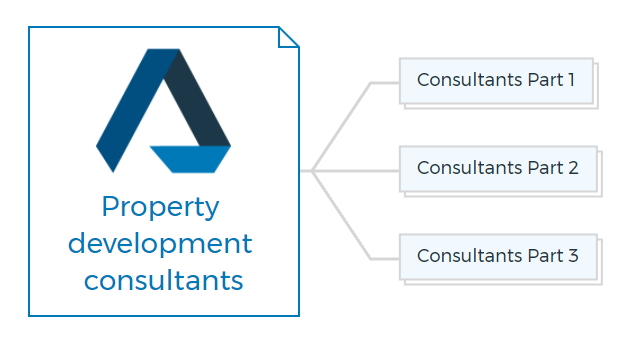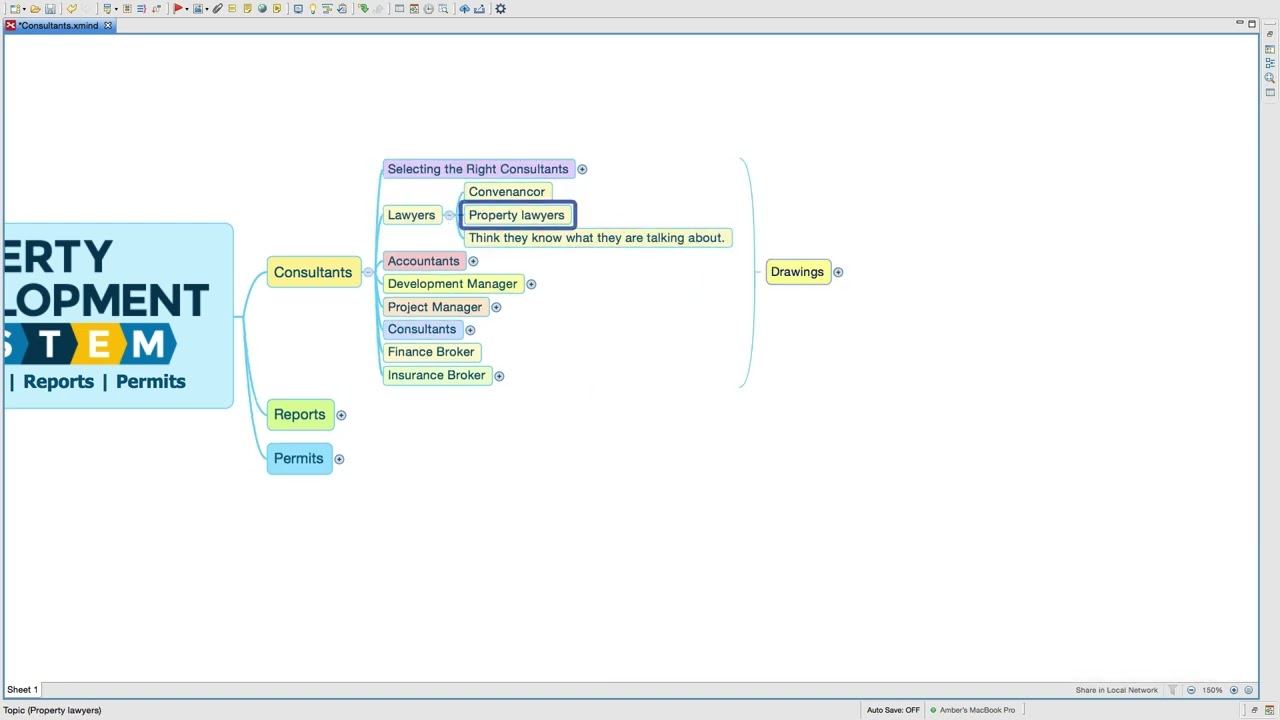Property development consultants
Consultants Part 1
Here the focus is on the variety of consultants needed in construction and development projects, emphasising the importance of choosing specialists tailored to specific project needs.
Selection Process
Emphasises the importance of selecting the right consultants, like architects and accountants, based on their experience with similar development projects.
Specialisation
Highlights the necessity of engaging with consultants who specialize in the project’s scope. It mentions working with different architects for projects of varying complexities and needs.
Professional Insurance
Stresses the importance of consultants having their own professional indemnity insurance to avoid getting caught in a blame game within the industry.
Legal and Accounting Advice
Discusses the critical role of property lawyers and accountants in navigating legal complexities and financial structures of development projects. It cautions against engaging lawyers and accountants without the specific experience or understanding of the project’s needs.
Development and Project Management
Differentiates between the roles of development managers and project managers in guiding the development strategy and overseeing the construction process, respectively.
Insights based on numbers
- The video mentions a range of different projects, from single dwellings to 18 townhouses and 16 apartments, illustrating the varying scales and complexities of projects consultants might specialise in.
- Four different architects are utilised for different types of projects, demonstrating a strategic approach to leveraging expertise based on project requirements.
Frequently Asked Questions
How does the selection of consultants affect the overall success of a construction project?
Expertise and Experience
The success of a project heavily depends on the consultant’s expertise and experience in similar projects.
For instance, choosing an architect who has never designed a multi-unit development for a project involving 12 townhouses or 16 apartments can lead to inadequate advice and potentially flawed designs. The right consultant understands the specific challenges and requirements of the project, ensuring that they can provide valuable, actionable guidance.
Specialization
Developers engage with consultants who specialize in the exact type of project at hand. This specialization is crucial because it ensures the consultant has a deep understanding of the nuances and specific requirements of the project, from design to regulatory compliance.
For instance, the video mentions working with four different architects, each chosen for their expertise in different project types—ranging from basic designs to more complex and detailed architectural needs.
Risk Mitigation
Proper selection helps mitigate risks associated with project development, such as legal issues, financial mismanagement, or design flaws.
In what ways does professional indemnity insurance play a crucial role in the construction industry?
Risk Management
Professional indemnity insurance is crucial for managing the inherent risks in construction projects. It provides a safety net for consultants, covering legal costs and damages awarded against them if they are found to be at fault for professional negligence or failure to deliver services as promised.
This insurance is vital in an industry where small oversights can lead to significant financial losses or safety issues.
Blame Game Avoidance
The construction industry is described as a “finger-pointing, blame game” environment, where when something goes wrong, the tendency is to look for someone to blame.
Professional indemnity insurance helps consultants navigate this challenging aspect by ensuring they are not left vulnerable to potentially career-ending claims. It offers protection against the financial implications of being found liable for a mistake or oversight.
Client Confidence
Having professional indemnity insurance not only protects the consultant but also gives clients confidence in the consultant’s professionalism and their ability to cover any liabilities that may arise from their work.
It’s a mark of responsibility, showing that the consultant has considered the potential risks and has taken steps to mitigate them, thereby safeguarding both their interests and those of their clients.
Industry Standard
Professional indemnity insurance has become somewhat of an industry standard in construction. Consultants are expected to carry this insurance as part of their professional practice. It’s an essential aspect of risk management and is critical for maintaining a professional reputation and trust with clients.
How do development managers and project managers contribute differently to a project?
Development Managers:
Strategic Planning
Development managers play a crucial role in the strategic planning phase of a project. They are involved in developing the overall strategy, including site identification, due diligence, and concept development.
Financial Feasibility
They assess financial feasibility and work on business case development, which not only involves detailed financial planning but also considers the opportunity cost of different investment options.
Risk Management
Development managers are tasked with risk identification and management, ensuring that potential hurdles are anticipated and strategies are in place to mitigate them.
Legal and Financial Structuring
They navigate the legal documentation and are involved in the financial structuring of the project, ensuring that the project has a solid legal and financial foundation.
Consultant Engagement
Engaging consultants, obtaining planning permits, and organizing marketing and sales strategies are also within their purview, overseeing the project from a macro perspective to ensure all pieces align with the overarching strategy.
Project Managers:
Construction Focus
Project managers are more focused on the construction aspect of the project. Their role becomes central once the project enters the execution phase.
Technical Oversight
They are responsible for site preparation, working drawings, engaging consultants for construction-specific needs, and managing the specifications and bill of quantities.
Procurement and Estimation
Project managers handle estimation and procurement for construction, ensuring that materials and labor are obtained at the best possible prices and timelines.
Construction Management
They oversee the construction schedule, ensuring that the project stays on track, within budget, and meets the established quality standards. This includes coordinating different trades on-site and resolving any technical issues that arise during construction.
Builder Collaboration
A unique aspect of their role is the collaboration with builders. They ensure that builders have all the necessary details and support, facilitating a smooth construction process.
What are the different types of consultants needed in construction and development projects?
In construction and development projects, a variety of consultants are required, each bringing specialized expertise to ensure the project’s success. These consultants may include architects, accountants, property lawyers, development managers, and project managers. The choice of consultants depends on the specific needs and complexities of the project.
Why is the selection process of consultants important in construction projects?
Selecting the right consultants is crucial as their expertise and experience significantly influence the project’s outcome. Choosing consultants who have a track record of working on similar development projects ensures they understand the unique challenges and requirements of your project, leading to more effective and efficient solutions.
How does specialization affect the choice of consultants?
Specialization is key when choosing consultants for a project. For example, different architects might be chosen for projects with varying complexities and needs, such as single dwellings versus multi-unit townhouses or apartment buildings. Engaging with consultants who specialize in the specific scope of your project ensures they have the necessary skills and knowledge to address its particular demands.
Why is professional indemnity insurance important for consultants?
Professional indemnity insurance is vital for consultants as it protects both them and the project owner from financial losses in case of errors, omissions, or negligence in their services. This insurance is crucial to avoid getting caught in a blame game within the industry, ensuring accountability and peace of mind for all parties involved.
What role do property lawyers and accountants play in development projects?
Property lawyers and accountants play critical roles in navigating the legal complexities and financial structures of development projects. They offer advice on contracts, legal obligations, tax implications, and financial planning, making them indispensable for ensuring the project adheres to legal requirements and remains financially viable.
How do the roles of development managers and project managers differ?
Development managers and project managers have distinct roles in construction and development projects. Development managers guide the development strategy, focusing on the project’s conceptual and planning phases. In contrast, project managers oversee the construction process, ensuring the project is completed on time, within budget, and according to specifications.
Test Your Knowledge
Multiple-Choice Questions on the Role and Selection of Consultants in Construction Projects
1. Why is it important to choose the right consultants for a construction project?
A. To ensure the project is completed quickly.
B. To guarantee the lowest project cost.
C. To make sure the consultants are available at all times.
D. To ensure the consultant’s expertise and experience align with the project’s specific needs.
2. What is the significance of consultants having professional indemnity insurance?
A. It guarantees the project will be completed on time.
B. It prevents financial losses in case of errors or negligence in their services.
C. It ensures consultants are paid on time.
D. It avoids the need for consultants altogether.
3. Which of the following best describes the role of specialization in selecting consultants?
A. It is preferred but not necessary for the success of the project.
B. It ensures the consultant can manage multiple projects at once.
C. It ensures the consultant has a deep understanding of the specific types of projects.
D. It is only important for the selection of accountants and lawyers.
4. How do the roles of development managers and project managers differ in a construction project?
A. Development managers oversee construction while project managers handle financial aspects.
B. Development managers and project managers perform the same tasks.
C. Development managers guide the strategy, while project managers oversee construction.
D. Project managers guide the strategy, while development managers handle day-to-day operations.
5. What does engaging with multiple architects for different types of projects demonstrate?
A. A preference for architectural diversity regardless of project requirements.
B. A lack of confidence in a single architect’s abilities.
C. A strategic approach to leveraging specific expertise based on project requirements.
D. A higher overall cost for the project.
6. Why is caution advised against engaging lawyers and accountants without specific experience or understanding of the project’s needs?
A. They may not be available when needed.
B. They might charge higher fees than generalists.
C. Specific experience is crucial for navigating legal complexities and financial structures effectively.
D. They tend to take longer to complete tasks.
Answers:
- D. To ensure the consultant’s expertise and experience align with the project’s specific needs.
- B. It prevents financial losses in case of errors or negligence in their services.
- C. It ensures the consultant has a deep understanding of the specific types of projects.
- C. Development managers guide the strategy, while project managers oversee construction.
- C. A strategic approach to leveraging specific expertise based on project requirements.
- C. Specific experience is crucial for navigating legal complexities and financial structures effectively.
- B. The varying scales and complexities of projects consultants might specialize in.
Assignment
Practical Exercise: Understanding the Role of Consultants in Construction Projects
Objective:
This assignment is designed to deepen your understanding of the critical role that consultants play in construction and development projects, including the selection process, the importance of specialization, the necessity of professional indemnity insurance, and the distinct roles of various consultants involved in a project.
Part 1: Identifying the Consultants (To Do)
- List at Least Five Different Types of Consultants involved in construction and development projects and briefly describe the role of each.
- Case Study Analysis: Choose a construction project case study (real or hypothetical). Identify and list the consultants that would be necessary for the project’s success, providing reasons for each choice based on the project’s specifics.
Part 2: Selection Process and Specialization (Research & Response)
- Research: Find a real-world example of a construction project that failed or faced significant challenges due to poor consultant selection. Summarize the case, focusing on the selection process and the implications of the failure.
- Response: Based on what you’ve learned, outline a detailed consultant selection process for a hypothetical project involving the construction of a mixed-use development (residential and commercial). Emphasize the importance of specialization in your selection.
Part 3: The Importance of Professional Indemnity Insurance (Discussion)
- Discussion Point: Why is professional indemnity insurance crucial for consultants in construction projects? Provide a scenario where the lack of this insurance could lead to significant financial and reputational damage for both the consultant and the project owner.
Part 4: Legal and Accounting Advice (To Do & Reflect)
- Task: Create a checklist of criteria to consider when selecting legal and accounting consultants for a development project. Include at least five considerations in your list.
- Reflection: Reflect on a scenario where engaging a property lawyer or accountant without the specific experience or understanding of the project’s needs could lead to detrimental outcomes. Discuss the potential risks and how they could be mitigated.
Part 5: Distinguishing Between Development and Project Management (To Do)
- Comparison Chart: Create a chart that distinguishes between the roles of development managers and project managers. Include responsibilities, key skills, and outcomes for which each is accountable.
Part 6: Insights Based on Numbers (Analysis)
- Project Analysis: Given the mention of various project scales, choose three projects of different scales (e.g., single dwelling, 10 townhouses, and a commercial building). For each project scale:
- Identify the type of specialist consultants required.
- Discuss why different scales and complexities might require different types of architects or consultants.
Submission Guidelines:
- Compile your answers, research, reflections, and analysis in a single document.
- Include any references used for your research and case study analysis.
- Submit the document via mail or comments.




